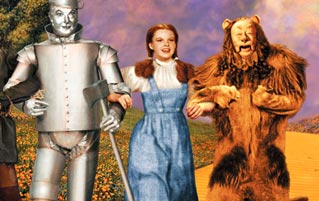How One Tiny Change Completely Ruined The Wizard Of Oz

For all of the surreal horror in The Wizard Of Oz, the darkest part is a little bit of symbolism that pretty much everybody misses. What makes it even darker is that the creators didn't even mean to put it there -- it just oozed out of their subconscious.
Even if you've never watched the 1939 classic, you probably get the gist of it. Dorothy, a lonely Kansas girl who counts middle-aged farmhands and a dog as her only friends, bumps her head during a tornado and passes out. While sleeping, she has what most of us would consider a traumatizing nightmare, in which she casts herself as an unwitting murderer not once but twice -- three times if you count what she did to fashion by wearing socks with pumps. So even before we get into the awful subtext, Dorothy has a fairly high body count for a rural teenager. She never gets terribly upset by this (though as a farm girl in 1939, she probably watched someone get accidentally mutilated by a thresher every week or so).
Her first episode of manslaughter happens when her house lands on the Wicked Witch of the East -- a living, breathing humanish person whose death immediately prompts a joyful song about how she's totally dead and burning in Hell now.

Manslaughter #2 happens when Dorothy accidentally throws water on the Wicked Witch of the East's sister, the Wicked Witch of the West. Water, it turns out, is WWW's only allergy, and she promptly melts. Her death is also greeted with cheers, because the only person who loved her is decomposing under a house in Munchkinland.

Joining Dorothy in her imaginary technicolor escape from justice are the three men who work on her family farm, now dressed up like freaks, and an even older man who pretended to read her fortune (in his trailer!) that very day. Her choice of companions are problematic in my book, but I'll get to that in a minute. The real problem with The Wizard Of Oz is that Dorothy's dream was never meant to be a dream at all. This right here is the first part of the hidden darkness we promised you a few paragraphs ago.
When L. Frank Baum wrote The Wizard Of Oz, he played the story straight. As in, Dorothy really did travel to Oz and meet a Scarecrow, Lion, and Tin Man, and those three friends weren't lazy analogues for the adult men in her life. (This explains why he was able to wrote more than a dozen of these books without this poor girl getting a concussion every time out.) It was MGM, the studio behind the movie, that looked at the box office numbers behind recent fantasy movies and decided audiences needed their witch and wizard stories grounded in reality. So they settled on the tired old Alice In Wonderland "It was all a dream" ending explanation.

Why was this a big deal? In one two-minute scene, the studio stripped Dorothy of her entire adventure and turned her into a crazy person. Without the dream, Dorothy is Luke Skywalker, Harry Potter, and E.T. rolled into one, and she was conceived and in print before most Americans had flushing toilets in their homes. Without the dream, she's a real-deal witch slaughterer who travels on foot across a country that no one in her world had ever seen before. She builds a team of fellow adventurers, exposes a fraudulent leader, and liberates two different races of Oz from bondage. She even survives a heroin overdose.

Turn her whole story into a dream, and we've got problems. For one thing, this young girl passes out, wakes up, and blurts out that the three men who work on her aunt and uncle's farm were with her in her dream. Not her aunt or uncle, just their workers. So ... the whole thing was a sex dream, right? If Dorothy was a teenage guy and dreamed about traveling on his own with three older, familiar women in the hopes of meeting a fourth older, familiar woman, there would have been a fluid situation to deal with upon waking.
Not to mention the weird work situation that happens once that the boss's niece proclaims that she's been dreaming about hanging out with the men on the farm. Even in the movie, the farmhands respond to her confession with awkward, polite laughter.

Even if we take the high road and dismiss the obvious, indisputable fact that Dorothy's whole adventure in Oz was a sexual awakening, there are much bigger problems at play with her story becoming a dream sequence. The first is that everyone in the room laughs at her when she tells them where she went. When she asks, "Doesn't anybody believe me?" her uncle answers "Of course we believe ya" with the enthusiasm of a wet sock. In the next breath, Dorothy gives up believing her dream was real, cheerfully exclaiming, "But anyway, Toto, we're home!" She then announces, "I'm not going to leave here ever, ever again!"

The book, on the other hand, ends with Dorothy landing back home, hugging her aunt, and saying, "I'm so glad to be at home again!" The movie ends with Dorothy professing her undying love for her home like her house is a new god that needs her exclamations of loyalty. Therein lies the rest of the dark, unintentional message the movie delivered to audiences of all ages around the world.
Take a step back and think about who was in theaters at the time the movie came out, the ones watching Dorothy accept that her death-defying romp through Oz was nothing but the side effect of a concussion, and then decide that being at home is all that matters. It may have been 1939, but I'm guessing the seats were filled with the same kinds of people who go to family movies today: moms and kids. But these weren't just any moms. In a few short years, those moms would be asked to do something that no generation of women had ever done before: Get out of the house and start working for the good of the country.

By 1944, there were over 19 million women in American factories, shipyards, and offices, presumably riveting everything they could get their dainty hands on. But when their husbands and boyfriends and brothers came back from World War II, the ladies were sent home so the vets could have jobs. In other words, they got Dorothyed. After learning how to build cool stuff and manage the home front while the men were away, women got the message that their adventure was over and home was where they belonged. And one of the first people to give them the message was Dorothy herself.

Here's Dorothy, the protagonist in one of the biggest fantasy blockbusters ever (and America wasn't exactly bursting with fictional female role models at the time), and some nameless executive not only turned her whole hero's journey into a make-believe story in her head, but they also landed her exactly where she started, with no lessons learned other than "STAY HOME FOREVER."
If you loved this article and want more content like this, support our site with a visit to our Contribution Page. Or sign up for our Subscription Service for exclusive content, an ad-free experience, and more.
For more check out 23 Famous Movies Full of Symbolism You Didn't Notice and 15 Famous Movies With Hidden Symbolism You didn't Notice.
Subscribe to our YouTube channel and check out 6 Famous Movies With Mind-Blowing Symbolism, and watch other videos you won't see on the site!
Also follow us on Facebook. For real.
Angels are real, and they are bad frickin' news. Robert Brockway's Vicious Circuit series is a punk rock, dark fantasy full of horror and humor. Check out the first two books, and pre-order the third, Kill All Angels, available December 26th.

